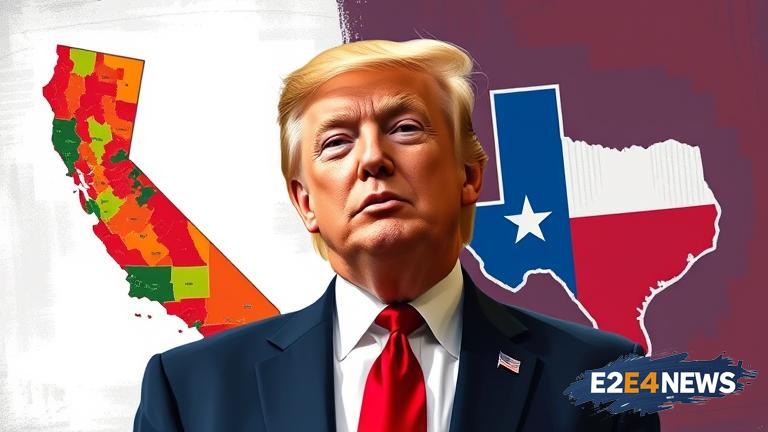The lawsuit, filed by a group of voters and advocacy organizations, claims that Trump and other Republican leaders engaged in a concerted effort to manipulate electoral district boundaries in California and Texas for partisan gain. The plaintiffs argue that this gerrymandering has resulted in the disenfranchisement of minority voters and the suppression of Democratic votes. The lawsuit specifically targets Trump’s involvement in the redistricting process, alleging that he used his influence to push for maps that would favor Republican candidates. The plaintiffs point to public statements made by Trump, in which he expressed his support for the redistricting efforts and encouraged Republican lawmakers to pass maps that would benefit the party. The lawsuit also names other high-ranking Republican officials, including the Republican National Committee and the National Republican Congressional Committee, as defendants. The plaintiffs argue that these organizations worked together to coordinate the redistricting efforts and to raise funds to support the maps. The lawsuit claims that the defendants’ actions were motivated by a desire to maintain Republican control of the House of Representatives and to limit the voting power of minority communities. The plaintiffs point to data showing that the new district maps in California and Texas have resulted in a significant reduction in the number of competitive districts, making it more difficult for Democrats to win seats. The lawsuit also alleges that the defendants’ actions have resulted in the packing of minority voters into a limited number of districts, reducing their influence in other parts of the state. The plaintiffs argue that this is a clear example of racial gerrymandering, which is prohibited by the Voting Rights Act. The lawsuit seeks to have the court declare the redistricting maps in California and Texas unconstitutional and to order the defendants to create new maps that are fair and representative of the state’s diverse population. The case is likely to have significant implications for the 2024 elections, as the redistricting maps will play a major role in determining the balance of power in the House of Representatives. The lawsuit is also seen as a test of the Biden administration’s commitment to protecting voting rights and combating voter suppression. The Department of Justice has announced that it will be monitoring the case closely and may intervene on behalf of the plaintiffs. The lawsuit has sparked a heated debate over the role of politics in the redistricting process, with many arguing that the process should be taken out of the hands of partisan lawmakers and given to independent commissions. Others have argued that the lawsuit is an example of Democratic sour grapes, and that the redistricting maps are a legitimate reflection of the will of the voters. The case is expected to be heard in federal court in the coming months, with a decision likely to be appealed to the Supreme Court. The outcome of the case will have significant implications for the future of American democracy, and will be closely watched by voters and politicians across the country. The lawsuit is a reminder that the struggle for voting rights and fair representation is ongoing, and that the courts will play a critical role in shaping the future of American politics. The case is also a testament to the power of grassroots activism, as the plaintiffs are a group of ordinary citizens who have come together to challenge the powerful interests that seek to manipulate the electoral system. The lawsuit has sparked a wave of activism and organizing, with many groups and individuals speaking out against the redistricting maps and calling for reform. The case has also highlighted the importance of independent redistricting commissions, which can help to take the politics out of the redistricting process and ensure that maps are drawn in a fair and representative way. The lawsuit is a call to action, urging Americans to get involved in the fight for voting rights and fair representation. The case is a reminder that democracy is not a spectator sport, and that citizens must be actively engaged in the process of shaping the future of their country.
